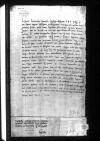Postquam ex tuis litteris cognovi episcopum te designatum non tam tibi videbar iure gratulari posse, quod tanta dignitate esses auctus, quam mihi primum gaudere, qui sic te colo, ut tuis bonis aequae delecter ac meis. Deinde meliora de nostris temporibus sperare, cum iis viris aliquem locum esse videam, qui prudentia usuque rerum et praeterea singulari doctrina possint, virtute vero maximos honores gerere debeant, nequi enim tu, sed nollo queri et alios vituperare te potius currentem instigabo, ut bonitatae naturae ac disciplinae tuae utaris. Reliqua video fore digna christiano nomine.
De Georg von Logau (Georgius Logus) (*1495 – †1553), humanist, Silesian poet; in the period of 1527-1529 was staying in Cracow in company of his cousin Georg von Logschau (an imperial envoy); in 1530 took part in the Imperial diet in Augsburg and there met Ioannes Dantiscus; in 1537 took up a residence in Wrocław; 1525 secretary and councellor of archduke Ferdinand von Habsburg; 1537 parish priest of St. Cross' and canon of St. John's church in Wrocław⌊LogoGeorg von Logau (Georgius Logus) (*1495 – †1553), humanist, Silesian poet; in the period of 1527-1529 was staying in Cracow in company of his cousin Georg von Logschau (an imperial envoy); in 1530 took part in the Imperial diet in Augsburg and there met Ioannes Dantiscus; in 1537 took up a residence in Wrocław; 1525 secretary and councellor of archduke Ferdinand von Habsburg; 1537 parish priest of St. Cross' and canon of St. John's church in Wrocław⌋ hoc tibi persuadeas velim, si mihi semper fuisset inimicus, tua commendatione fieri potuisse, ut in intimis ac familiaribus meis esset. Nunc vero septem ac amplius annorum mutua inter nos coniunctio, temporis intervallo quo afuimus non magis intermissa quam optata, ita hominem commendat, ut iniuriam mihi fieri putem, cum ab aliis commendatur.
Fuerunt tamen in hoc genere gratissimae litterae tuae, nam et egregiam in Georg von Logau (Georgius Logus) (*1495 – †1553), humanist, Silesian poet; in the period of 1527-1529 was staying in Cracow in company of his cousin Georg von Logschau (an imperial envoy); in 1530 took part in the Imperial diet in Augsburg and there met Ioannes Dantiscus; in 1537 took up a residence in Wrocław; 1525 secretary and councellor of archduke Ferdinand von Habsburg; 1537 parish priest of St. Cross' and canon of St. John's church in Wrocław⌊LogumGeorg von Logau (Georgius Logus) (*1495 – †1553), humanist, Silesian poet; in the period of 1527-1529 was staying in Cracow in company of his cousin Georg von Logschau (an imperial envoy); in 1530 took part in the Imperial diet in Augsburg and there met Ioannes Dantiscus; in 1537 took up a residence in Wrocław; 1525 secretary and councellor of archduke Ferdinand von Habsburg; 1537 parish priest of St. Cross' and canon of St. John's church in Wrocław⌋ voluntatem, et officium non necessarium mirifice sum complexus, teque animo cohortatus, ut si non habes alia, de his saltem saepius ad nos scribas. Quae enim studiosissimi et tibi deditissimi cura operave praestari possunt, ea si tibi prompta a nobis et parata existimabis, non fallo |(?) mihi crede opinionem tuam.
Vale et me Cornelis De Schepper (Cornelius Scepperus, Cornelis De Dobbele, Cornelius Duplicius) (*1503 – †1555), erudite, diplomat in the Habsburgs' service; close friend of Ioannes Dantiscus; initially in the service of Christian II of Oldenburg, King of Denmark; 1526 secretary and councillor to Emperor Charles V of Habsburg (CE, vol. 3, p. 218-220; DE VOCHT 1961, p. 15-24)⌊CornellioCornelis De Schepper (Cornelius Scepperus, Cornelis De Dobbele, Cornelius Duplicius) (*1503 – †1555), erudite, diplomat in the Habsburgs' service; close friend of Ioannes Dantiscus; initially in the service of Christian II of Oldenburg, King of Denmark; 1526 secretary and councillor to Emperor Charles V of Habsburg (CE, vol. 3, p. 218-220; DE VOCHT 1961, p. 15-24)⌋ praeclarissimo et optimo viro, in quo amando tecum contenderim, etiam atque etiam commendabis.
 BJ, BAS, No. 6, p. 1unnumbered
BJ, BAS, No. 6, p. 1unnumbered
